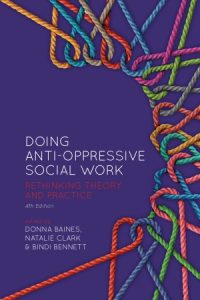Rethinking Theory and Practice, 4th edition
Submission to The Social Lens: A Social Work Action Blog by Professor Donna Baines.


When I was approached by my publisher to start thinking about a 4th edition, I felt a big sea change was needed to keep the book fresh and relevant. Wayne Antony at Fernwood Publishing was keen to do a bit of a retrospective, rethinking areas of social work where theory was thin and critical practice less developed. Keeping with the theme of foregrounding voices historically marginalized, I invited two Indigenous social work scholars to join as co-editors, Natalie Clark and Bindi Bennett. In the early conceptual days of the book, we also consulted extensively with Hannah Kia on transgender and 2SLGBTQI+ issues. This new team brought new authors and new perspectives to the 4th edition, and I am very grateful to them and in awe of their unwavering commitment to social justice, decolonization and equity.
The 4th edition of Doing Anti-Oppressive Social Work goes well beyond its predecessors, updating and revising popular chapters, but also problematizing AOP and engaging closely with new and emerging issues. Doing Anti-Oppressive Social Work once again brings together critical social work authors to passionately engage with pressing social issues, and to pose new solutions, practices and analysis in the context of growing inequities and the need for reconciliation, decolonization and far-reaching change. Indigenous, Black, racialized, transgender, (dis)Ability and allied scholars provide identity-engaged and intersectional analyses on a wide-range of issues facing those working with intersectional cultural humility, racism and child welfare, poverty and single mothers, critical gerontology and older people, and immigrant and racialized families. Like the first three editions, the 4th edition emphasizes the voices of those less heard in social work academia and provides cutting-edge critical reflection and skills, including social work’s relationship to the state, and social work’s responsibility to individuals, communities, and to its own ethics and standards of practice.
To hear from the authors themselves and to further the discussion of anti-oppressive theory and practice, please join our virtual launch of the 4th edition of Doing Anti-Oppressive Social Work on Wednesday, January 25, 2023 at 4pm PST. Details and registration can be found here:
THE SOCIAL LENS: A SOCIAL WORK ACTION BLOG - The views and opinions expressed in this blog are solely those of the original author(s) and do not express the views of the UBC School of Social Work and/or the other contributors to the blog. The blog aims to uphold the School's values and mission.

